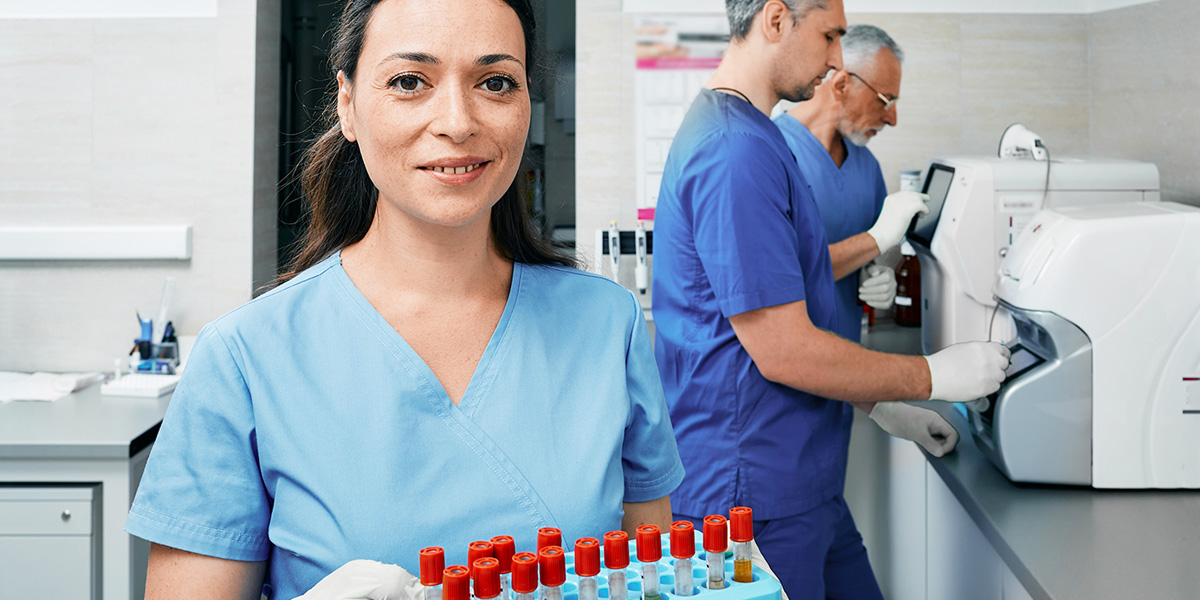Course: GES1045 Certified Phlebotomy Technician (Voucher + Lab Included)
Phlebotomy Technician Training
Become a Certified Phlebotomy Technician
Phlebotomy Technicians are essential to proper healthcare worldwide as they are responsible for drawing blood needed for tests, donations, transfusions, and research. As the population ages and diseases spread across the globe, the need for qualified phlebotomists will only increase. This 100% online course will train you to work as a phlebotomy technician and prepare you for the Certified Phlebotomy Technician (CPT) certification from the National Healthcareer Association (NHA).
Job Outlook for Certified Phlebotomy Technician
- The US Bureau of Labor Statistics (BLS) forecasts 11% growth in the demand for Phlebotomists between now and 2031, much faster than the average for all occupations.
- According to the Bureau of Labor Statistics (BLS), the average Phlebotomy Technician makes over $38,480 with top earners pulling in nearly $50,000 per year.
Certified Phlebotomy Technician FAQs
WHAT DOES A PHLEBOTOMY TECHNICIAN DO?
Phlebotomy Technician are responsible for drawing blood needed for tests, donations, transfusions, and research, conducting patient interviews, checking patients' vital signs, and transporting blood samples to the laboratory for testing.
WHERE DO CERTIFIED PHLEBOTOMY TECHNICIANS WORK?
Whether you choose to work in a hospital, medical lab, blood donation center, or doctor’s office, phlebotomy technicians perform an essential function our healthcare system by working directly with patients as well as doctors, nurses, and other healthcare professionals.
WHY IS THE DEMAND SO HIGH FOR PHLEBOTOMY TECHNICIANS?
According to the BLS, blood analysis remains an essential function in medical laboratories and hospitals. Demand for phlebotomists will remain high as doctors and other healthcare professionals require bloodwork for analysis and diagnosis. In addition to blood analysis, phlebotomists are necessary for blood collection, either at mobile blood centers or dedicated donation centers. These phlebotomists may be especially busy during a health emergency, which can correspond with heightened interest in blood donations.
Course Objectives
What you will learn
- Summarizing the role and the responsibilities of a Phlebotomy Technician
- Ability to describe basic anatomy as it applies to blood and function
- Applying quality and safety measures as they relate to phlebotomy
- Preparing for blood collection
- Performing sample collections
- Executing post-collection procedures
- Choosing ethical behavior that upholds the rights and dignity of patients
How you will benefit
- You will have a complete comprehension and understanding of all tasks related to the role and responsibilities of a certified phlebotomy technician
- You will receive comprehensive and all-inclusive training, which will help you gain a new vocation as a phlebotomy technician and be fully prepared for any clinical scenario
- You will be prepared to sit for the Certified Phlebotomy Technician (CPT) certification exam through the National Healthcareer Association (NHA). A voucher is available upon eligibility
Prerequisites and Requirements
To take this online course, you should have one of the following: High School Diploma, GED or equivalent, entrance test, or previous healthcare experience. To qualify for the certification exam, a High School Diploma or equivalent is required. Please check with your state for any specific requirements they might have before registering for the course.
Curriculum
- Introduction to Phlebotomy
- Anatomy for Phlebotomy Technicians
- Personal and Patient Safety
- Infection Control
- Quality Control
- Foundations and Preparations for Blood Collections
- Performing the Blood Collection
- Post-Collection Procedures
- Dermal Puncture and Capillary Collection
- Post-Collection Procedures for Dermal Puncture and Capillary Collection
- Special Collections
- Special Considerations
- Non-Blood Collections and Less Commonly Performed Procedures
- Lab Procedures, Processing, and Operations
- Legal and Ethical Matters
Instructors
Dr. Barry Martin
Barry Martin has been working in the medical lab for the past 15 years as a certified medical laboratory scientist. Dr. Martin received his doctorate degree from Liberty University, his master's degree from NC A&T State University, and undergraduate degrees from Winston-Salem State University, UNCG, & Lenoir-Rhyne College. Dr. Martin has a vast amount of experience working in the lab and enjoys sharing his knowledge with others.
Dr. Georgia McCauley
Dr. Georgia McCauley has worked as a phlebotomy and medical laboratory science educator for 25 years and has been a certified medical laboratory scientist for over 40 years. She earned a Ph.D. and an MBA in Health Care Administration, and undergraduate degree in business and medical technology.
Dr. Karen Hunter
Karen Hunter holds a Ph.D. and Master of Science in Health Care Administration and undergraduate degrees in Biology and Medical Technology. She has been a certified Medical Technologist for more than 30 years and has over 20 years of experience in Medical Laboratory Science and Phlebotomy education. Highlights of her career include designing and implementing a Medical Laboratory Science program at the Polytechnic of Namibia, Africa and developing Phlebotomy workshops at several Community Colleges.
Registration and Enrollment
This course is open enrollment. You can enroll and begin anytime.


 Give to Florida Tech
Give to Florida Tech 
